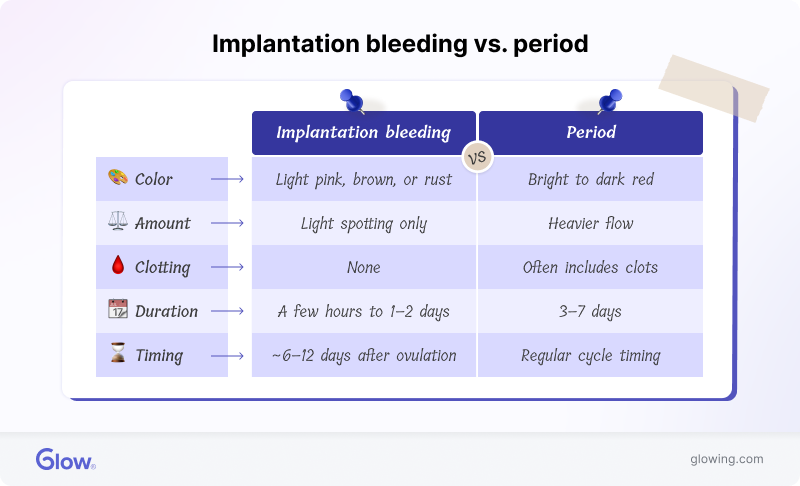Implantation Bleeding or Your Period? Everything You Need to Know
When you’re trying to conceive, every little twinge or change in your body can feel significant. One of the early signs that many women look for is implantation bleeding.

Although you know your body better than anyone else, it’s still possible to mistake implantation bleeding for your period. What exactly is implantation bleeding, and how can you tell if you’re experiencing it?
What is implantation bleeding?
Implantation bleeding is light spotting that can happen when a fertilized egg embeds itself into your uterus lining, also known as the endometrium. Implantation typically occurs 10–14 days after fertilization—although the timing can vary—and it’s a natural part of early pregnancy. 1
After fertilization, the embryo takes about 30 hours to travel through your fallopian tube before reaching your uterus. 2 By the time it reaches this stage, it has transformed into a blastocyst, a rapidly dividing cluster of cells. 3
Your endometrium will thicken (under the influence of estrogen) to create a nourishing environment, which makes it possible for the embryo to embed itself securely. When the blastocyst burrows into your uterine lining, it may tear open tiny blood vessels, causing a small amount of vaginal bleeding. 4
Not everyone experiences implantation bleeding. It’s estimated to occur in just 15–25% of pregnancies, and many women who do experience it may not even realize what it is, sometimes mistaking it for the start of their period. 5
Implantation bleeding symptoms
Besides light spotting, you may experience other symptoms associated with implantation during early pregnancy: 6
- Mild cramping (usually lighter and shorter in duration than menstrual cramps)
- Nausea
- Breast pain and tenderness
- Headaches
- Mood swings
- Lower back pain
These symptoms aren’t unique to implantation bleeding and could also be ovulation symptoms, the result of menstruation, or something else. The best way to confirm your pregnancy is to take a pregnancy test a few days after missing your period.
What to know about the implantation dip
Many women who track their basal body temperature (BBT), or their body’s lowest resting temperature, claim it noticeably drops around the time when implantation usually occurs.
While you might take this implantation dip as a sign that you’re pregnant, it’s by no means a reliable way of confirming pregnancy. To reiterate, the only surefire way of knowing whether you’re pregnant is by taking a pregnancy test.

Implantation bleeding vs. your period: how to tell the difference
Because you’ll usually have implantation bleeding 10–14 days after an egg is fertilized, you may mistake it for an early period. 1 However, there are key differences:
- Color: Menstrual blood is usually bright or dark red, while implantation bleeding is typically pink, brown, or rust-colored.
- Amount: Implantation bleeding is light, unlike a full menstrual flow. This is why it’s often characterized with the word “spotting.”
- Duration: Implantation bleeding typically only lasts a few hours or a few days at most. If it lasts longer, it’s most likely your period. 1
- Clotting: Unlike a period, implantation bleeding doesn’t usually contain clots.
Can you take a pregnancy test if implantation bleeding occurs?
Yes, if you see what you suspect is implantation bleeding, you can take a pregnancy test. However, for the most accurate results, it’s best to wait a few days after the spotting stops, ideally until the day you miss your period.
The lag between conception—your egg getting fertilized—and getting a positive test is known (somewhat infamously) as the two-week wait. Implantation occurs in the middle of this stretch, not at the very beginning, but you’ll still need to wait at least a few days for enough hCG (human chorionic gonadotropin), the pregnancy hormone, to build up in your system for the test to detect. 7
If you take the test when you first see blood and get a negative result, that doesn’t necessarily mean you aren’t pregnant. You may need to wait a few days and take the test again to be sure.
Other reasons for bleeding in early pregnancy
While implantation bleeding is one possible explanation for early pregnancy spotting, other causes can include: 8
- Cervical irritation: Your cervix is more sensitive during pregnancy, and you might get light spotting after a pelvic exam or sex.
- Vaginal infections: Some infections, particularly sexually transmitted diseases (STIs) like gonorrhea or chlamydia, can cause light spotting. 9
- Early pregnancy complications: Bleeding that is heavy, prolonged, or accompanied by severe pain could indicate an issue like an ectopic pregnancy or miscarriage, which requires medical attention.
If you have any of these issues, your doctor may categorize your pregnancy as a threatened miscarriage. This scary-sounding term doesn’t mean your pregnancy is doomed—it just means your symptoms elevate you into a higher risk category, meaning you may need closer medical supervision.
If you experience severe cramping, dizziness, heavy bleeding, or pain in your shoulders or pelvis, call your doctor immediately.
When to see a doctor
Implantation bleeding is generally harmless, but there are times when you should get a doctor to evaluate early-pregnancy bleeding: 8
- Positive pregnancy test and bleeding: If you have a positive pregnancy test and then experience bleeding, check with your doctor to rule out any concerns.
- Heavy bleeding: Any heavy bleeding, especially if you have clots, should be addressed immediately.
- Severe cramping or pain: Intense pain, particularly one-sided pelvic pain, could indicate an ectopic pregnancy.
- Prolonged bleeding: If bleeding lasts more than a few days or increases over time, call your doctor.
Final thoughts
Don’t panic over a little blood—implantation bleeding is a natural part of early pregnancy. Having it doesn’t necessarily mean there’s anything wrong with your pregnancy, nor does its absence. Many healthy pregnancies occur without any implantation bleeding at all.
Just take a home pregnancy test a few days after your missed period for some more definitive answers. If you’re feeling impatient and need to know now, you can also get professionally tested by a doctor to see whether you should start stockpiling diapers.
Article Sources
- Penn Medicine Lancaster General Health. "Implantation Bleeding or Your Period? How to Spot the Difference" Retrieved April 8, 2025.
- UCSF Health. "Conception: How It Works" Retrieved April 8, 2025.
- MedlinePlus. "Fetal development" Retrieved April 8, 2025.
- American Pregnancy Association. "What is Implantation Bleeding?" Retrieved April 8, 2025.
- American College of Obstetricians and Gynecologists. "Bleeding During Pregnancy" Retrieved April 8, 2025.
- Office on Women's Health. "Stages of pregnancy" Retrieved April 8, 2025.
- Office on Women's Health. "Pregnancy tests" Retrieved April 8, 2025.
- MedlinePlus. "Vaginal bleeding in early pregnancy" Retrieved April 8, 2025.
- Cedars-Sinai. "Cervicitis" Retrieved April 8, 2025.







